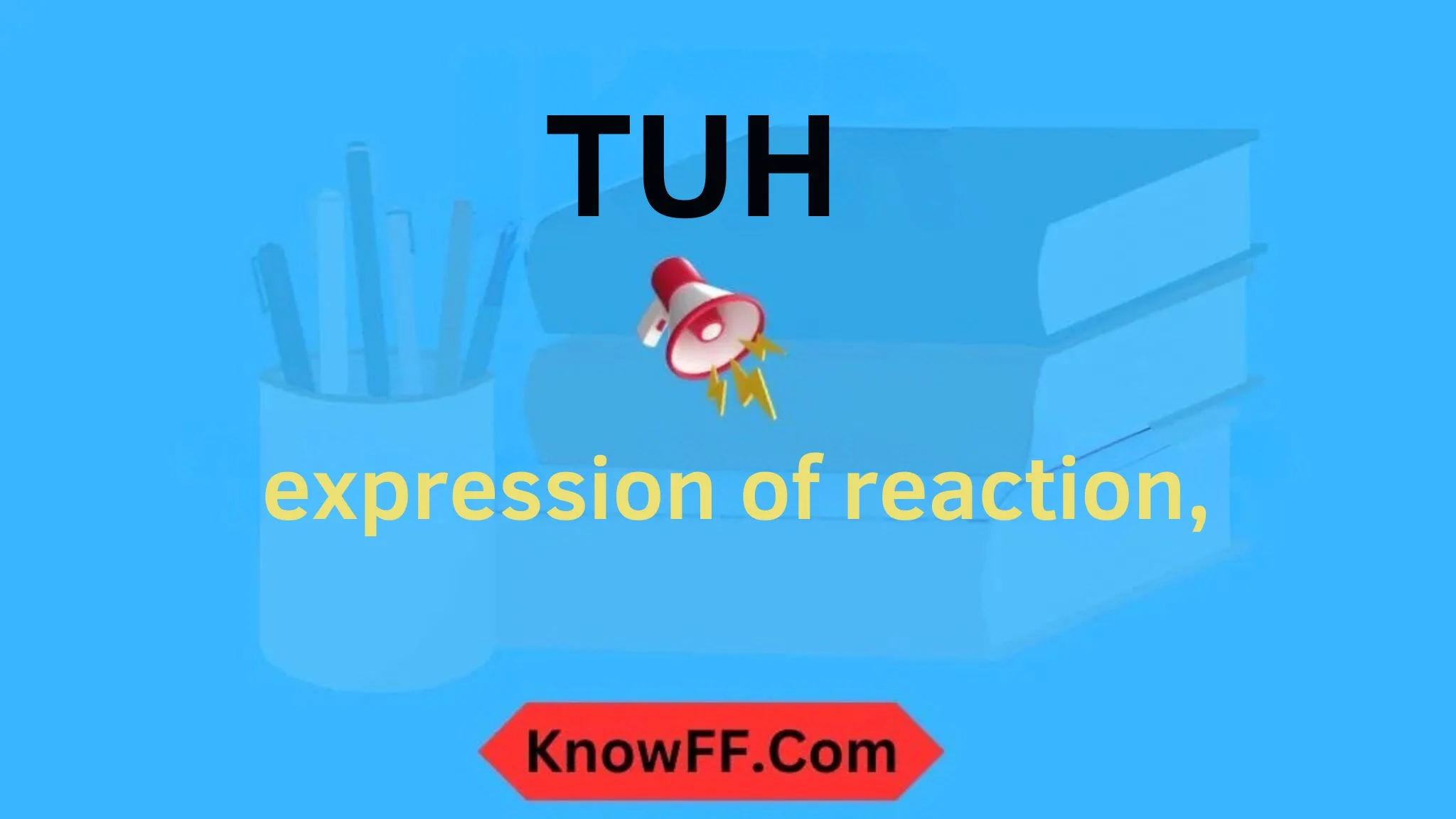In the fast-paced world of digital communication, abbreviations and slang words help people express emotions, reactions, and thoughts quickly.
One such commonly used slang is TUH, often seen in text messages, social media posts, and online chats. People frequently search for “TUH meaning in text” to better understand what it implies and how it should be interpreted.
While TUH might look like just a random set of letters, it carries a strong expression, often replacing words or sentences. Depending on the context, it can reflect disbelief, annoyance, or sarcasm.
Like many internet acronyms, TUH has evolved into a versatile term with different meanings across various platforms.
This article will break down the definition, background, usage across contexts, misconceptions, and relevance of TUH in digital communication, helping you understand exactly what it means and how to respond when you see it.
Meaning & Definition
In text conversations, TUH is not an acronym but rather an expression of reaction, similar to a scoff, sigh, or laugh. It is often typed as a phonetic version of a dismissive sound people make when they find something ridiculous, unbelievable, or not worth taking seriously.
- Primary meaning: A reaction expressing disbelief, annoyance, or mockery.
- Tone: Dismissive, sarcastic, or skeptical depending on context.
For example:
- Friend 1: “I can totally run a marathon tomorrow.”
- Friend 2: “TUH, sure you can.”
In short, TUH is the written equivalent of rolling your eyes or making a sarcastic sound.
Background
The slang TUH has its roots in African American Vernacular English (AAVE), where it mimics a scoffing sound people make in casual conversations. Over time, social media platforms and texting culture adopted it as a way to capture that sound in writing. Unlike acronyms such as LOL or BRB, TUH is more of an onomatopoeic expression—it represents how something sounds rather than shortening words.
With the rise of Twitter, Instagram, and TikTok, TUH spread widely as people began using it to respond quickly with sarcasm or disbelief. Its simplicity and effectiveness made it popular among younger generations, who often use it to express attitude or sass without needing long explanations.
Usage in Different Contexts
Chat and Text Messaging
In personal texting, TUH is often used to react dismissively:
- “You think you’re the smartest here? TUH.”
- “TUH, as if that’s ever going to happen.”
Social Media (Instagram, TikTok, Twitter/X)
On social media, TUH is usually paired with memes, gifs, or sarcastic captions:
- A TikTok skit might end with “TUH” to emphasize disbelief.
- Instagram users may comment “TUH” under exaggerated claims or posts.
Professional Fields
In professional environments, TUH is not appropriate. Using slang like TUH in business emails, official reports, or academic writing would be seen as unprofessional. Unlike acronyms such as ASAP or FYI, TUH is purely informal.
Meaning in Chat, WhatsApp, Instagram, TikTok
- WhatsApp/Chat: TUH is casually dropped in group conversations as a quick sarcastic response.
- Instagram: Common in captions or comments mocking unrealistic posts.
- TikTok: Used in reaction videos or skits as a punchline.
- Snapchat: Sent with photos to emphasize attitude or disbelief.
For instance:
- On TikTok: “POV: Someone says they’ll call you back. TUH.”
- On WhatsApp: “He said he’ll change this time. TUH.”
Meaning in Physics, Medical, and Aircraft Terminology
Unlike some acronyms that carry multiple professional meanings, TUH does not have any standard meaning in physics, medicine, or aviation.
It remains primarily a slang expression used in informal contexts. However, misunderstandings can occur if someone assumes it has a technical meaning.
Common Misconceptions
- TUH is an acronym – False. TUH is not short for anything; it is a sound-based expression.
- TUH always indicates hate – Not true. It often reflects disbelief, sarcasm, or even playful banter.
- TUH is universally understood – While common online, older generations or professionals may not recognize it.
Similar Terms & Alternatives
Some expressions carry similar tones or functions to TUH:
- SMH (Shaking My Head) – Expresses disapproval or disbelief.
- LOL (Laugh Out Loud) – Can be sarcastic in tone.
- Pfft / Hmph – Written equivalents of scoffing sounds.
- GTFO (Get The F* Out)** – A stronger, more aggressive dismissal.
How to Respond to TUH
If someone sends you TUH, your response depends on the situation:
- Playful banter: Reply with humor. Example: “Haha, you know I’m right though!”
- Sarcastic dismissal: Ask for clarification. Example: “What do you mean by that TUH?”
- Serious context: Ignore if it’s meant negatively, or address the issue directly.
Differences from Similar Words
- TUH vs. SMH: SMH is more disappointed, TUH is more sarcastic.
- TUH vs. LOL: LOL indicates laughter, TUH signals mockery or disbelief.
- TUH vs. IDC (I Don’t Care): IDC expresses indifference, TUH expresses dismissiveness with attitude.
Relevance in Online Conversations & Dating Apps
On dating apps like Tinder or Bumble, TUH may appear in playful banter or sassy exchanges:
- “You think you’re hotter than me? TUH.”
- “TUH, that’s the worst pickup line I’ve ever heard.”
Here, TUH adds humor or sarcasm to conversations. However, using it in serious or sensitive chats can come off as rude, so context is key.
Conclusion
The slang TUH in text is an expression of disbelief, sarcasm, or dismissal. It’s not an acronym but a written form of a scoffing sound often used in casual digital communication.
While it has no professional or technical meaning, TUH has become popular across WhatsApp, Instagram, TikTok, and other social platforms, often carrying sass or playful attitude.
Understanding TUH helps avoid misinterpretations and makes online interactions smoother. Always remember that context determines whether it feels humorous or offensive.











